Twitter will steal Facebook’s bacon and become the most powerful brand advertising platform on the planet.
That’s saying a lot since I previously called Twitter the Underpants Gnomes of the Internet. But Twitter has changed and is no longer simply an altruistic agent of social change with revenue as a side gig. In 2013, Twitter means business.
That’s Entertainment
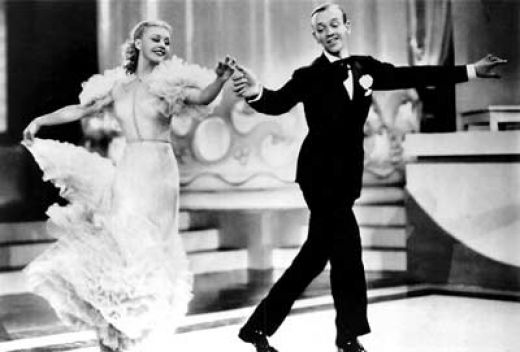
Those who have been on Twitter the longest probably still think of Twitter as an information source. You may remember back in 2009 when people began talking about how Twitter was their replacement for RSS feeds.
I was not one of those people. Don’t get me wrong, I found some value out of Twitter from an information perspective (and still do), but the signal to noise ratio was never that good.
But here’s what I’ve realized. Twitter is not about information anymore. It’s meta-entertainment.
Mark Cuban recently called Facebook a time waster, an alternative to boredom that looked far more like TV than a Google search. I think he’s right and his description applies to both Facebook and Twitter.
Supporting the idea of social media as entertainment is a March of 2012 The Hollywood Reporter study.
Nine of 10 respondents view social networking sites like Twitter and Facebook as a new form of entertainment, and more than half say social media sites are important tastemakers in determining what to watch and buy. Perhaps more surprising, 80 percent of television viewers visit Facebook while they watch.
Of course I have to believe these numbers might be a bit over-inflated based on who commissioned the study, but the general thesis resonates and seems solid.
Mobile Is Where It’s At
60% of our 140 million active users access Twitter through mobile – up from 55%. #Twitter4Brands
— Twitter Advertising (@TwitterAds) June 7, 2012
Twitter was mobile before it was sexy to be mobile. Mind you, it wasn’t really Twitter who figured out mobile. They had a robust community of third-party developers who led them to that conclusion over the course of many years. With all that data staring them in the face they moved quickly to double down on mobile. And it’s paid off.
Oh, did you notice the hashtag in that Tweet? Hello McFly!
Multi-Screen Viewing
Twitter’s lead in mobile has allowed them to capture the multi-screen viewing market. Make no mistake, this is the future of content consumption. Twitter understands that they can play a huge part, perhaps the connective tissue, between TV and other screens.
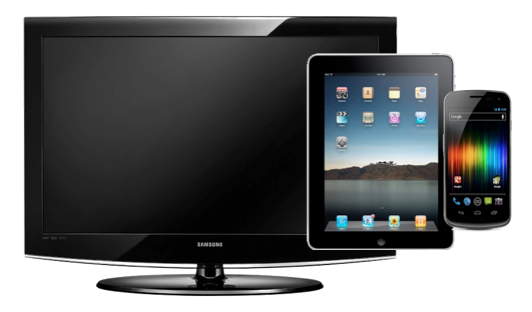
These are not this or that experiences but this and that experiences. Twitter is adding value to mass media content.
Pew found that 52% of adult cell phone owners use their phones while watching television. That’s the popular stat but it gets even more interesting if you look at just smartphone users.
Fully 74% of smartphone owners reported using their devices in one way or another while watching television in the preceding 30 days, compared with 27% of non-smartphone owners.
Of course, smartphones comprise the majority of phones (and rising), making this even more important. Yet, an April 2012 Forrester report shows that smartphones are already being displaced in many ways by tablets.
Tablets are displacing PCs and smartphones as the “couch computer” of choice: 85% of US tablet owners use their tablets while watching TV, and according to Nielsen, 30% of total tablet time is spent while watching TV.
The real takeaway here isn’t which screen is winning but that we’re entering a multi-screen viewing environment. Twitter, not Facebook, seems best positioned to capitalize on this new reality.
Owning The Hashtag
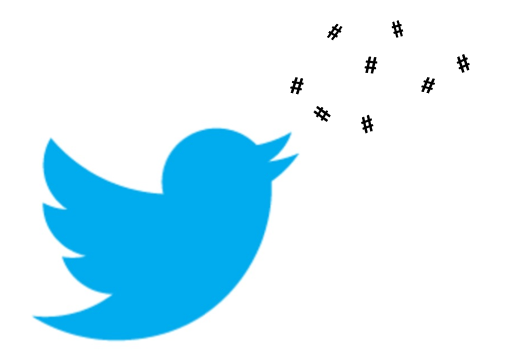
The hashtag is Twitter’s secret weapon.
While anyone can use a hashtag most consumers see it as synonymous with Twitter. I have to say I wasn’t a huge fan of the hashtag at first. Or, rather, I didn’t like the way many abused it, using more hashtags than normal words in a Tweet. (I still think that’s moronic.)
But hashtags are clearly a great way to aggregate content on a topic or event. Just watch a stream of Tweets from a conference and you’ll begin to understand the value of hashtags.
What’s more, when you’re attending a multi-track conference you often use the stream of Tweets from the sessions you don’t attend as a comparison and cheat sheet. It’s not unusual to hear someone complain that they were in the wrong session based on a comparison of Tweet streams.
Yet, I was still annoyed by hashtags until I read a piece by Denton Gentry on the use of hashtags to improve communication. Sure hashtags were great functionally but Denton made me realize that they were also ways to add expression.
Why does this matter in this context? The hashtag became entertainment. Hashtag memes were born and those brands who understood how to tap into this dynamic could create entertainment.
Collaborative Entertainment
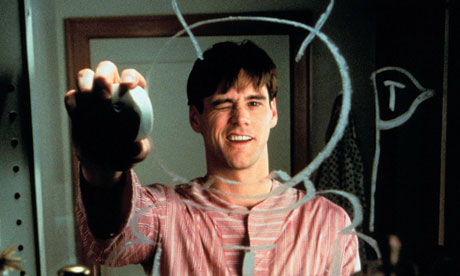
The hashtag and Twitter’s short form anti-conversation content has created an opportunity for collaborative entertainment. It’s not about conversations it’s about the ever-changing aggregate of opinion, insight and snark.
I was recently down in Los Angeles on business and happened to be in the airport during the second Presidential debate. How did I wind up ‘watching’ it? On Twitter using the #debate stream. It was actually quite easy, interesting and fun to follow the debate this way.
I wasn’t going to wade into the mess of politics with my own Tweets but it was an entertaining way to view the debate and how others were interpreting it.
Pages vs Hashtags
Since the introduction of the Open Graph I really thought that Facebook wanted to kill Pages. In the last few years Facebook has made it more and more difficult for brands and businesses to make Pages worthwhile.
Yes, yes, I know you have a client or a case study that shows they’re killing it on Facebook but from the reduced functionality and reach I think most are swimming upstream on Pages.
I actually think it’s a smart idea to get rid of Pages but that’s a post for another day. The problem is Facebook has no alternative place to aggregate brand conversations. Unfortunately, Facebook doesn’t support the hashtag.
Facebook conversations are with brands. Twitter conversations are about brands.
This is really the functional difference between the two platforms right now. Many still cling to the notion that people want to have conversations with brands. I simply don’t think that’s true. Conversations with brands are not social. Yet that’s the implicit goal of Facebook Pages.
Conversely you need not follow a brand on Twitter to view that stream of hashtag content. I can tune in when I want and it doesn’t even need to be explicitly brand centric. Examples are littered over our television screens. Think of the hashtags on Survivor (#rewardchallenge and #immunitychallenge) or The Soup (#satanstoaster) to name just a few.
The hashtag is both a connection and platform for multi-screen collaborative entertainment.
User Centric Engagement
You don’t have to follow CBS or Survivor. You tune in when you want to tune in. Think about how scary and powerful that is!
The brand account could still be a valuable part of the ecosystem but it wouldn’t need to be the center of the brand experience. That might allow accounts to add value instead of incessantly trying to collect followers and figure out ways to break through the noise or crack the EdgeRank algorithm.
In fact, brands can participate in the hashtag stream along with everyone else, supplying ‘official’ announcements or insider content when appropriate. The role of an official account is to egg on your fans to provide that meta-entertainment.
Sure, the number of fans or followers seems comforting but we’ve all seen how little engagement results from these massive numbers. In the end it comes down not to who you follow but what content you’re engaging in.
Viewers Like You
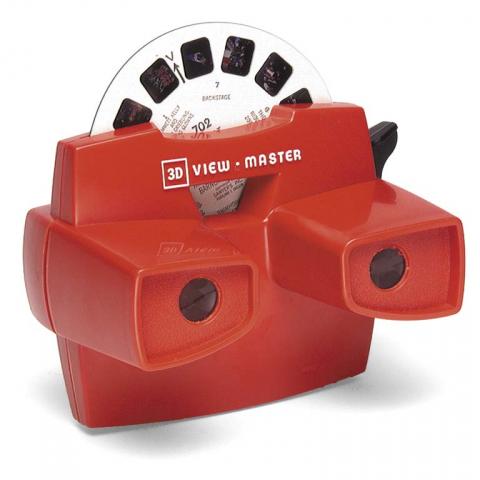
Imagine knowing which hashtag streams a user has viewed! How valuable would that information be? How easy would it be to advertise to lapsed viewers? Or to understand the other programming or products you might be losing out to based on viewing behavior. This isn’t about the brands I say I like but the ones I’m actively consuming.
The hand-wringing over active users as defined as those who Tweet or how many people they follow may be completely specious. The pure ‘lurker’ may be just as valuable, particularly for brand advertisers. I’d be far more interested to know about interaction based how many hashtag streams users viewed and the dwell time on those streams.
And there’s a really interesting opportunity to map hashtags to brands and categories, not to mention crawling the public social graph of accounts to develop demographic data. It would become relatively easy to match advertisers to users who frequently view a variety of hashtag streams.
The discussion around viewers makes me think about traditional TV advertising. Twitter seems to think so too if comments by Joel Lunenfeld at IAB MIXX are any indication.
A campaign on Twitter, he said, is “the ultimate complement to a TV buy.”
Can they make it any more clear?
Beyond Text
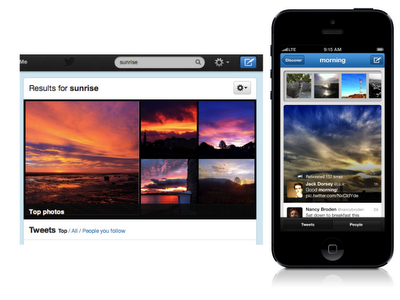
Twitter is doing a lot to make the experience more visual which is critical not just to keep up with competitors but to get mainstream adoption. And the new email Tweet feature continues to push them to a broader audience.
Again, I think Twitter is being relatively transparent in how they’re approaching this issue.
People tell incredible stories on Twitter through photos and videos. When you search for a person, an event or a hashtag, you can now see a grid of the most relevant media above the stream of Tweets.
You can also see media instantly in your search results stream on iPhone and Android. Photos and article summaries automatically show previews to give you a bird’s eye view on what’s happening.
This makes Twitter far more visual, compelling and … entertaining. The need for a consistent experience is also the reason why Twitter pulled back on the third-party apps and ecosystem as a whole.
You need a reliable, safe and consistent platform when securing major brand advertisers.
Context Matters
Facebook has a lot of advantages in being able to capture attention and profile interests. But there’s a fundamental problem with Facebook. It’s far more about navel gazing than anything else. The context is still largely personal.
Facebook aggregates your social graph while Twitter aggregates everything around a specific topic.
Even when someone shares something on Facebook it’s as much about who shared it with you as what is shared. You’re connected with the person not the content. Twitter is the other way around, with content coming first and people reduced to a filter.
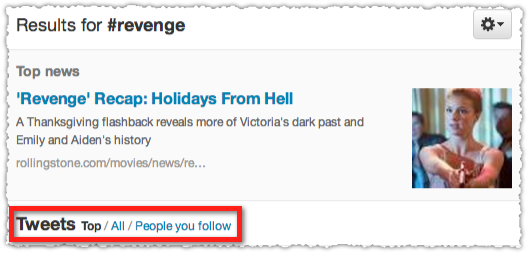
Both platforms deliver a type of social voyeurism as entertainment, but the context is different.
Checking out the photos from a friend’s marathon run is not the most effective time or place to advertise running shoes. Sure the topic is right but the context is all wrong. I’m not looking at the marathon photos with shopping in mind. Heck I could hate running. Instead, I’m doing so because I want to keep up with my friend.
The person is important, the content isn’t. That’s not an optimal environment for advertising, even for intent generation.
Twitter Advertising
Twitter has been busy building out different advertising opportunities culminating recently in interest targeting. I’m not sure how this will all work for small businesses, but I don’t think anyone has fully solved that one yet.
However, I believe Twitter is laying the groundwork to catch traditional offline brand advertising dollars moving online. Twitter is creating a comfortable and recognizable entertainment platform that allows advertisers to connect and extend traditional channels.
Not only will brands and businesses want to advertise against these new forms of meta-entertainment, but they’ll seek out ways to create their own. There’s been a lot of talk about content marketing lately but what I see is the dawn of content advertising.
TL;DR
Twitter has quickly evolved into a collaborative entertainment platform that serves as the glue of multi-screen viewing. Their focus on mobile, visual makeover and tacit ownership of the hashtag puts Twitter and not Facebook in a position to capture the lion’s share of brand advertising dollars moving online.
The Next Post: Reclaiming Lost iOS Search Traffic
The Previous Post: Keyword Match Ratio

18 trackbacks/pingbacks
Comments About Twitter Will Win The Social Brand Advertising War
// 27 comments so far.
David // November 26th 2012
Hmm… i do agree there is a disconnect but looking at revenue, it’s Facebook that is still the darling of the media world also looking at what Facebook Australia is doing with their new CEO being poached from head of Google Mobile/Social Head in Asia/Pacific.
AJ Kohn // November 27th 2012
Thanks for the comment David. And you’re right that Facebook is still the destination for most brands and is currently controlling the conversation about social brand advertising.
Up until this year Twitter didn’t really have it together. They were a mess with huge internal battles and little direction. But what they’ve done in the last year is impressive. 2012 was the year they built the engine and began to hone their message to brands. 2013 is the year I see things taking off.
The funny thing about that announcement you mention is that it identifies their primary weakness, they haven’t figured out mobile. Facebook is trying to catch up but it might be too little too late.
Max Minzer // November 26th 2012
AJ, you’re spot on with Twitter being “about brands” and “around a specific topic.” It’s much more efficient for discovering like-minded fans and “connecting.”
I’ll add that G+ (I’m sure you left G+ out for a reason) combines those two qualities in addition to what Facebook failed to provide brands with. And by doing that – creating a great platform for initial discovery/connection that will be followed by long-lasting and engaged community.
Here’s the main thing for me though why Twitter and G+ will dominate – connected and multi-screen consumer expectations are changing dramatically and business is changing with it (while Facebook is anti-business with recent efforts). Not because your “brand must be on Twitter/Facebook or you’re going out of business” concept (which is a lie).
AJ Kohn // November 27th 2012
Thanks Max. I did edit out a section on Google+ because the piece was getting a bit too dense. Google+ does have the added benefit of the hashtag (thanks Chris Messina!) and the ability to pivot around a topic. Google+ also has a fairly decent mobile presence.
However, Google+ is targeted at long-form content in many ways and in deepening discussions. It’s really about conversations! And I don’t see that as an effective place to advertise. But it is to actually engage with your users. So in that way it functions a bit more like Facebook (talking with brands). The difference is that the results of those discussions impact a user’s search results. That’s a huge benefit and one that Facebook can’t provide.
The multi-screen experience is really the driving force here. Users are adapting these new technologies in ways we might not have expected and some brands will be able to see and take advantage of that. What’s interesting is that some will create extended collaborative content (aka entertainment) and then Twitter can sell advertising to … anyone on that content.
Jon Henshaw // November 26th 2012
I’m still holding out for something decentralized, like Diaspora running on top of Tent. I’m still not convinced that Twitter or Facebook are here for the long term. If only the decentralized option could become drop dead simple, and be supported by major companies (the likes of Google), then it might stand a chance. A person can dream, can’t they? 😉
This entry was an interesting read nonetheless, and you’re probably right.
AJ Kohn // November 27th 2012
Thanks for the comment Jon. I think many in the tech crowd (that’s you!) are hoping for something neutral and decentralized. The hashtag actually is that but … Twitter essentially owns it in the minds of most consumers. Perhaps that will change but Twitter has a pretty big lead right now.
Jason Nelson // November 26th 2012
Good job on this post AJ. I think Twitter has done a better job of staying cool and hip compared to Facebook. Facebook looks like its still in 2007. Twitter fits perfectly with a mobile, short attention span, entertainment driven audience. While it has value in its visibility and engagement, this article had some interesting data on how Twitter directly affected black friday sales purchases.
AJ Kohn // November 27th 2012
Thanks Jason. You nailed it with short attention span, entertainment driven audiences. That’s where Twitter flourishes.
The IBM data in that linked piece is interesting but I’d want to see how it fit into their attribution model. I see both Twitter and Facebook as potential intent generation platforms that contribute to long-term ROI but not as intent harvesting platforms (which is where Google rules the roost.)
Darren Moloney // November 27th 2012
I said earlier this year – on Twitter – that # and @ are the most powerful symbols in the world right now.
These symbols give us a way (in our absolute millions) that can stop and make the world’s political leaders think if, say things deteriorate even further on a global scale – now that’s influence that Facebook cannot come close to… why? Because they don’t use the power of hashtags…
AJ Kohn // November 27th 2012
Exactly Darren! The # and @ symbol are the most powerful in the world right now. And while anyone can really use those symbols I think Twitter has essentially cornered the market on them (for now.)
Bernie Borges // November 27th 2012
I generally agree that Twitter has the potential to be the social media channel of choice for advertisers especially since Facebook is a #fail for so many brands. But, Twitter’s use growth will need to grow ten fold for that to happen.
Most people who use Twitter are also on Facebook. But, many people on Facebook are not on Twitter. In fact, many people still don’t understand Twitter. That needs to change for Twitter to win the social advertising war.
AJ Kohn // November 27th 2012
Thanks for the comment Bernie. I think bringing Twitter to the mainstream is certainly an issue and I see the email Tweet feature as part of that process.
Yet, there are reports that Twitter has reached 500MM accounts and continues to grow. In addition, I think the hashtag streams are made for those who don’t really understand Twitter. These are people who will watch the stream but never participate or Tweet themselves.
Growth and adoption are still necessary but I’m not sure the gulf between the two is as large as many think.
Darren Moloney // November 27th 2012
Further to your timely post this came out about hashtags today:
http://mashable.com/2012/11/27/parents-name-baby-hashtag/
Twitter’s definitely gonna win for sure! 😀
George LaRochelle // November 27th 2012
Wow, great post and not even close to TL;DR. I love the comparison you made. Facebook conversations are with brands. Twitter conversations are about brands.
Twitter definitely fits better with today’s youth and attention span and by owning the mobile experience they can only grow. Almost every new TV show and comercial you see now is rolling with hashtags. Survivor and AmazingRace even have their hosts live tweeting with the audience during the shows.
I was never a big fan of Twitter in the beginning but you would have to be blind (or a 5 year old) to not see they are poised to make a splash in 2013.
AJ Kohn // November 28th 2012
Thanks for the comment George. It’s gratifying to see you (and many others) pick out the ‘conversations with vs about’ line. It was the first sentence I wrote for this piece.
You also bring up a great point about hosts (or athletes or actors) live Tweeting in those hashtags during the show. It’s just one more way that those hashtag streams add value as another dimension of entertainment that can’t be found elsewhere.
That’s even more important because of the tight relationship you then have between the # and @. It solidifies the notion that the # is owned by Twitter.
Bill Sebald // November 27th 2012
I think Facebook is missing out with some kind of open or parametric keyword tracking option, ie their hashtag. My guess is it’s used far less frequently on Twitter than it should be. I see how the mobile thing is a huge trophy for Twitter, that makes sense.
Gotta think though that Facebook could still tighten into a more solid competitor if they pressed their UI and some of these features. Groups and subscriptions (follow) are downplayed. Their search is weak. And EdgeRank should be configurable. For someone like my girlfriend, who strongly favors Facebook over Twitter, she follows and scrolls more multimedia material than most users who just follow their friends. She’s using Facebook like Twitter pretty successfully for her tastes, despite not really being shown how to use FB this way. She picked it up somehow, where with Twitter it was more natural.
AJ Kohn // November 28th 2012
Thanks for commenting Bill. And I completely agree that Facebook could do a number of things to improve in this regard.
I just find Pages and the Open Graph to be strategically at odds with each other. One is for creating content on Facebook while the other is about sucking outside content into Facebook. I think the latter is far more elegant and they could then use all the data to create topical views of shared pages and sites.
I still think a simple ‘More Like This‘ link would be a pretty big improvement. But Facebook seems to be stuck in neutral in many regards or perhaps feels that maintaining user attention and improved targeting are enough?
The question is how long will your girlfriend put up with the obstructive Facebook configuration? I think she (and many others) are one hashtag stream experience away from an epiphany, much like my #debate moment in the airport.
Dan Limbach // November 28th 2012
Good article.
Facebook and Twitter both have their issues, and I’m not convinced either will be around 10 years from now. If I had to bet, I would say Facebook has better legs because it is a robust platform, supports an ecosystem of apps, and has an advertising substructure.
The more people you follow on Twitter, the harder it is to use. The noise level is so loud, I feel lucky if one tweet out of 100 is worth the time it took to read. I generally avoid Twitter unless I am researching something. Hashtags are the saving grace for Twitter, as you covered so well in the article.
I will scan Facebook more because the quality of the content and the depth of the connections is much better. Even so, Facebook is indeed a big time waster. I guess they said that about TV as well.
AJ Kohn // November 29th 2012
Thanks Dan. I think you touch on the major pivot that Twitter is going through. I don’t foresee Twitter being a place where you simply look at an unfiltered stream of content. Like you said, the signal to noise ratio sucks and always has for the most part.
Facebook feels better but only because we use it for personal connections rather than what Twitter was, which was more broadly informational.
The difference now is that hashtags and topical aggregation make it a stream of filtered traffic which might be interesting informationally but is really more aimed at entertainment.
I think new users to Twitter will follow far fewer folks but will consume hashtag streams as their method of engagement. In short, I think the way ‘old timers’ are using Twitter is … wrong and the future is something very different.
Chris Irwin // December 01st 2012
Thanks AJ. I tend to agree that Twitter is set to win the Social Brand Advertising War. This pretty much sums it up “Facebook conversations are with brands. Twitter conversations are about brands”. I believe that its more about the consumers perception of the brand that will ultimately lead to the conversion over the brand promoting their own cause on a Social Media platform like Facebook.
Heather Physioc // December 02nd 2012
I wouldn’t mind if all social networks – including Pinterest, Facebook, etc. – adopted the hashtag system. With Twitter, Google+ and Instagram already on board, imagine the structured data possibilities if all social networks were using the hashtag model. You could get a REAL picture of the ULTIMATE social network.
Also… TRUE LIFE: “…when you’re attending a multi-track conference you often use the stream of Tweets from the sessions you don’t attend as a comparison and cheat sheet. It’s not unusual to hear someone complain that they were in the wrong session based on a comparison of Tweet streams.”
Matt Buys // December 06th 2012
Great post. You dug deeper than the conventional wisdom on social media trends, and i appreciate your viewpoint. Do you think that Twitter has a future as a direct marketing option, or will it’s main functions continue to be customer service interaction and brand awareness building? Thanks again.
Lewis LaLanne // December 06th 2012
I love this point you make here AJ . . .
“This isn’t about the brands I say I like but the ones I’m actively consuming.”
The famous Emerson quote is so fitting in this context, “Your actions speak so loud that I can’t hear what you’re saying.
In my direct response marketer mind, votes with dollars and tracked and documented actions are king when it comes to making decisions on what to spend our precious alert attention on.
Thanks AJ for reminding me of such an important lesson and enlightening me on this whole hash tag phenomena. 🙂
khuyi // December 09th 2012
AJ – great post, and I couldn’t agree with you more. Another reason I think over time Twitter will best Facebook – it is based on interests rather than friends, and therefore is more likely to truly evolve over time in ways that are interesting to advertisers. We are also finding Twitter ads are scaling faster and more efficiently than on Facebook. Are you ever in NYC? I work at HowAboutWe and know my team would love to meet you if so.
Ricardo Motti // December 12th 2012
All fine points, but I’m curious about the number of active users. My dataless observation tells me less and less people are on Twitter on a daily basis.
It feels like Twitter has been the less improved social network over the last few years. The major visual/interface innovation in the last 12 months has been the cover image, and what a debacle that is. The tightening of the API makes it even worse.
If you take how 4square improved, bringing bored users back again and again, I feel Twitter only has the features, and not the management, to win the war.
Oremo Ochillo // January 06th 2013
I agree with Twitters focus on mobile being to their benefit. But I would say that it doesn’t have to do with them focusing more on mobile than say Facebook. The problem that Facebook runs into is that Facebook by its very nature just isn’t mobile. Twitter is essentially text messaging on steroids so it is mobile at its core. Google+ also was built with the android OD in mind so it just feels more mobile than Facebook. I don’t know if Facebook will ever really be a great mobile experience because of it.
I also agree that Twitter is the second screen app of choice. I would say it is very difficult for anyone to disagree with this who has ever been on Twitter during a major event such as the Presidential Debate, Superbowl, or the premier of a popular show like Game of Thrones.
Ted Ian Osias // December 23rd 2014
Truly, Advertising on Twitter can get you a lot more web traffic for your business. It is a powerful marketing tool that will help you make a success of your brand. You can reach a target market that is instantly made aware of your promotions and your site. This post couldn’t be written any better! Two thumbs up!
Sorry, comments for this entry are closed at this time.
You can follow any responses to this entry via its RSS comments feed.